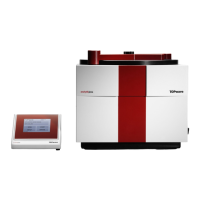TOPwave Appendix
75
11.1.4 Cooling down samples
As a rule, the samples cool down in 15 – 20 min. to the point at which they can be ope-
ned. However, the cooling-down time can reduced to 5 – 10 min. if the digestion vessels
are placed in a water bath containing cold water.
11.1.5 Dilating Sealing lips
The sealing lips of maximally 6 caps can be dilated fast and simply in the 6-fold dilation
tool.
11.1.6 Rupture discs and locking lids
For specific applications Analytik Jena AG offers stainless steel rupture disks to be used
with the PM 60 vessels. Applications are, for example, the digestion of RoHS samples or
plastic materials up to 250 mg original sample weight.
For specific applications Analytik Jena offers TFM-PTFE caps with the PM 60 and PL
100 vessels, which are used without additional metallic rupture disks. Potential applica-
tions are, for example, digestions for ultra-trace analytics such as those performed in the
semiconductor industry.
When using these TFM-PTFE caps/rupture disks it must be borne in mind that the
rupture pressure depends on the temperature and the time digestion takes. The reason
for this is the reduced strength of the TFM material at higher temperatures. Metallic
rupture disks do not demonstrate this dependency in the temperature range < 300°C,
which is why it the standard rupture disks used at Analytik Jena are metallic ones.
A bulge in the center of the rupture disc after use is normal and will not affect its func-
tions, for a bulge lager than 80 % we recommend to replace the disc.
Stainless steel rupture
disks
TFM-PTFE rupture discs
Inspection of Rupture
Discs and Lids

